
BANG! is a shootout game, in Spaghetti Western style, between a group of Outlaws and the Sheriff, who is their primary target.
The Deputies incognitos help the Sheriff, but there is also a Renegade pursuing his own goal! In BANG! you play one of these roles, and represent a famous Wild West inspired character.
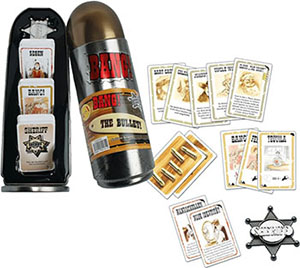
Components
- 16 character cards
- 80 playing cards
- 7 summary cards
- Instructions
Object of the Game
Each player has his own goal:

Sheriff: must eliminate all the Outlaws and the Renegade, to protect law and order.

Outlaws: they would like to kill the Sheriff, but they have no scruples about eliminating each other to gain rewards!

Deputies: they help and protect the Sheriff, and share his same goal, at all costs!

Renegade: he wants to be the new Sheriff; his goal is to be the last character in play.
Setup
Take as many role cards as the number of players, divided as follows:
- 4 players: 1 Sheriff, 1 Renegade, 2 Outlaws
- 5 players: 1 Sheriff, 1 Renegade, 2 Outlaws, 1 Deputy
- 6 players: 1 Sheriff, 1 Renegade, 3 Outlaws, 1 Deputy
- 7 players: 1 Sheriff, 1 Renegade, 3 Outlaws, 2 Deputies
Shuffle the cards and give one, face down, to each player. The Sheriff reveals himself by turning his card face up; all other players look at their role but keep it secret.
Shuffle the characters and give one face up to each player. Each player now announces the name of his character and reads his ability.
Each player takes another character card, from the left over cards, turns it face down to show the bullets on the back, and covers it partially with his character card to show exactly as many bullets as there are depicted on the character card. During the game, the bullets will be progressively covered, to show that the character has been injured.
The Sheriff plays the game with one additional bullet: if his character card shows three bullets, he is considered for all effects to have four; if he has four bullets, then the Sheriff plays with five.
Put the remaining role and character cards back in the box.
Shuffle the playing cards, and give each player as many cards, face down, as the bullets represented on his character card. Put the remaining playing cards face down in the middle of the table, as a draw pile. Leave room for the discard pile. Give each player a summary card.

Note: for your first few games, you can try a simplified version of the game by removing all cards with the symbol of a book before getting started.
Characters
Each Western character has some special abilities, which make you unique. The series of bullets near the character's picture show how many life points you begin the game with, i.e., how many times you can be hit before being eliminated from play.
Moreover, the bullets indicate how many cards you can hold in your hand at the end of your turn (hand size limit).

Example: Jesse Jones has 4 life points: he can be hit four times before being eliminated from the game. Moreover, Jesse can hold up to four cards in his hands at the end of his turn.
In the picture, though, Jesse has already lost one life point, as the bullet-card under him is showing: three more hits and he will be out!
Also, Jesse can only hold up to three cards in his hand at the end of his turn, because he is down to three life!
Game Play
The game is played in turns, in clockwise order. The Sheriff begins. Each player's turn is divided into three phases:
- Draw two cards;
- Play any number of cards;
- Discard excess cards.
1. Draw Two Cards
Draw the top two cards from the draw pile. As soon as the draw pile is empty, shuffle the discard pile to create a new playing deck.
2. Play any Number of Cards
Now you may play cards to help yourself or hurt the other players, trying to eliminate them. You can only play cards during your turn (exception: Missed! and Beer). You are not forced to play cards during this phase. You can play any number of cards; there are only three limitations:
- you can play only 1 BANG! card per turn;
- you can have only 1 copy of any one card in play;
- you can have only 1 weapon in play.
Example. If you put a Barrel in play, you cannot play another one, since you would end up having two copies of the same card in front of you.

There are two types of cards: brown-bordered cards (= play and discard) and blue-bordered cards (= weapons and other objects).
Brown-bordered cards are played by putting them directly into the discard pile and applying the effect described with text or with symbols on the cards (illustrated in the next paragraphs).
Blue-bordered cards are played face up in front of you (exception: Jail). Blue cards in front of the players are hence defined to be "in play". The effect of these cards lasts until they are discarded or removed somehow (e.g. through the play of a Cat Balou), or a special event occurs (e.g. in the case of Dynamite).
There is no limit on the cards you can have in front of you provided that they do not share the same name.
3. Discard Excess Cards
Once the second phase is over (you do not want to or cannot play any more cards), then you must discard from your hand any cards exceeding your hand size limit. Remember that your hand size limit, at the end of your turn, is equal to the number of bullets currently shown on the card that lies under your character card.
Then it is the next player's turn, in clockwise order.
Eliminating a Character
When you lose your last life point, you are eliminated and your game is over, unless you immediately play a Beer (see below).
When you are eliminated from the game, show your role card and discard all the cards you have in hand and in play.
Penalties and Rewards
If the Sheriff eliminates a Deputy, the Sheriff must discard all the cards he has in hand and in play.
Any player eliminating an Outlaw (even if the eliminating player is himself an Outlaw!) must draw a reward of 3 cards from the deck.
End of the Game
The game ends when one of the following conditions is met:
-
the Sheriff is killed. If the Renegade is the only one alive, then he wins. Otherwise, the Outlaws win;
-
all the Outlaws and the Renegade are killed. The Sheriff and his Deputies win.
Example 1: All the Outlaws are eliminated, but the Renegade is still in play. In this case, the game continues. The Renegade must now face the Sheriff and his Deputies alone.
Example 2: The Sheriff is killed, all the Outlaws are eliminated, but one Deputy and the Renegade are still in play. The game ends with the Outlaws winning! They achieved their goal at the cost of their own lives!
New Game
If you play more than one game in a row, players still "alive" at the end of the game may choose to keep their character for the following game; players which have been eliminated must draw a new character randomly.
If you want to give each player the opportunity of playing the Sheriff, you may decide, before starting the game, to pass this role among players from game to game, randomly assigning the other roles.
Now that you are familiar with the rules, let's see the cards of BANG! in detail!
The Cards
Distance Between Players
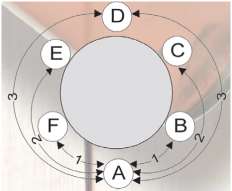
The distance between two players is the minimum number of places between them, counting clockwise or counterclockwise (see figure). The distance is very important, because all cards with a sight take it into account.
Normally you can reach only targets (players or cards) within a distance of 1.
When a character is eliminated, he is no longer counted when evaluating the distance: some players will get closer", when someone is eliminated. Two cards can alter the distance between players:

Mustang: when you have a Mustang horse in play the distance between other players and you is increased by 1. However, you still see the other players at the normal distance.
In the figure, if A has a Mustang in play, players B and F would see him at a distance of 2, C and E at a distance of 3, and D at a distance of 4, while A would continue seeing all the other players at the normal distance.
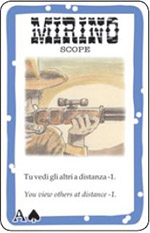
Scope: when you have a Scope in play, you see all the other players at a distance decreased by 1. However, other players still see you at the normal distance. Distances less than 1 are considered to be 1.
In the figure, if A has a Scope in play, he would see B and F at a distance of 1, C and E at a distance of 1, D at a distance of 2, while A would be seen by other players at a normal distance.
Weapons
You start the game with a Colt .45 revolver. This is not represented by any card. Using the Colt .45 you can only hit targets at a distance of 1, i.e. only players sitting to your right or your left.
In order to hit targets farther than distance 1, you need to play a bigger weapon. Weapons can be recognized from their blue border with no bullet holes, black-and-white illustration and the number into the sight (see picture) that represents the maximum reachable distance.
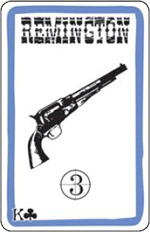
The weapon in play substitutes the Colt .45, until the card is removed somehow (e.g. through the play of a Panic!) or discarded (e.g. through Cat Balou).
The only weapon you can never lose is the good ol' Colt .45!
You can only have one weapon in play at a time: if you want to play a new weapon when you already have one, you must discard the one you already have.
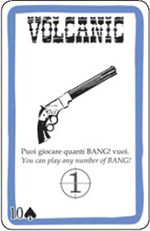
Volcanic: with this card in play you may play any number of BANG! cards during your turn.
These BANG! cards can be aimed at the same or different targets, but are limited to a distance of 1.
Bang! and Missed
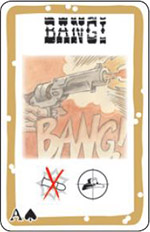
BANG! cards are the main method to reduce other players' life points. If you want to play a BANG! card to hit one of the players, determine:
- what the distance to that player is; and
- if your weapon is capable of reaching that distance.
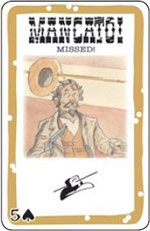
If you are hit by a BANG! you may immediately play a Missed!-even though it is not your turn!-to cancel the shot.
If you do not, you lose one life point (register this loss by sliding your character card over a bullet).
If you have no more bullets left, i.e. you lose your last life point, you are out of the game unless you immediately play a Beer.
The BANG! card is discarded, even when cancelled.
Note: you can only cancel shots aimed at you!
Beer
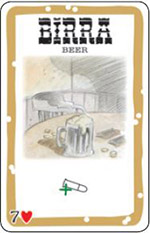
This card lets you regain one life point-slide the card so that one more bullet is shown.
You cannot gain more life points than your starting amount! The Beer cannot be used to help other players.
The Beer can be played in two ways:
- as usual, during your turn;
- out of turn, but only if you have just received a hit that is lethal (i.e., a hit that takes away your last life point), and not if you are simply hit.
Important note: Beer has no effect if there are only 2 players left in the game.
Draw
Some cards (Barrel, Jail, Dynamite) show little poker suits and values, then an equal sign and then their effects. When you want to use such a card you must "draw!", i.e., you have to flip over the top card of the deck, discard it, and look at the poker symbol in the lower left corner.
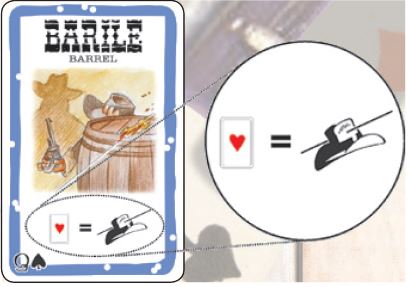
If this flipped card shows a symbol (and value!) that matches, then the "draw!" was successful, and the effect of the card is resolved (the "draw!" card is always discarded without effect). Otherwise, nothing happens: bad luck!
If a specific card value or range is specified on the card, then the "draw!" card must show a value within that range (including the pictured symbols), and the suit shown.
The value sequence is: 2-3-4-5-6-7-8-9-10-J-Q-K-A.
The Symbols on the Cards
Each card shows one or more symbols that show the effect(s) of
the card. Cards with symbols on two lines have two simultaneous effects.
-
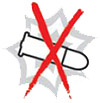
A BANG! (see BANG! and Missed!).
-

A Missed! (see BANG! and Missed!).
-

Regain one life point. Only the player playing this card benefits from this effect, unless otherwise stated.
-
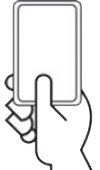
Draw one card. If "any player" is specified (see that symbol), then you can draw a random card from his hand, or you can choose one in play in front of him. If no player is specified, draw the top card of the deck.
In any case, cards drawn are added to your hand.
-
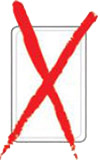
Force to discard a card. You can force a specified player to discard a random card from his hand, or you can choose and discard one card in play in front of him.
-

It specifies that you can apply the effect to any chosen player, regardless of the distance.
-

It specifies that the effect applies to all the other players -i.e., not the player who played the card-, regardless of the distance.
-

It specifies that the effect applies to any one player, provided that he is within a reachable distance.
-
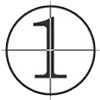
It specifies that the effect applies to any one player at a distance of the number or less. Note: Mustang and Scope can alter this distance, but weapons in play do not.
Special Cards

There are several types of special cards. All of them have the Book symbol. These cards have special rules stated briefly on them; they are explained in detail here:
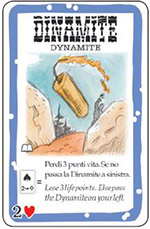
Dynamite: Play this card in front of you: the Dynamite will stay there for a whole turn. When you start your next turn (you have the Dynamite already in play), before the first phase you must "draw!"
- if you draw a card showing Spades and a number between 2 and 9, the Dynamite explodes! Discard it and lose 3 life points;
- otherwise, pass the Dynamite to the player on your left (who will "draw!" on his turn, etc)..
Players keep passing the Dynamite around until it explodes, with the effect explained above, or it is drawn or discarded by a Panic! or a Cat Balou.
If you have both the Dynamite and a Jail in play, check the Dynamite first. If you are damaged (or even eliminated!) by a Dynamite, this damage is not considered to be caused by any player.
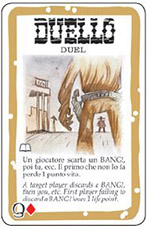
Duel: With this card you can challenge any other player (staring him in the eyes!), regardless of the distance. The challenged player may discard a BANG! card (even though it is not his turn!).
If he does, you may discard a BANG! card, and so on: the first player failing to discard a BANG! card loses one life point, and the duel is over. You cannot play Missed! or use the Barrel during a duel.
The Duel is not a BANG! card. BANG! cards discarded during a Duel are not accounted towards the "play 1 BANG! card" limitation.
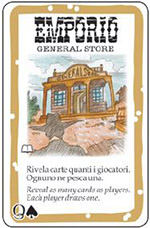
General Store: when you play this card, turn as many cards from the deck face up as the players still playing.
Starting with you and proceeding clockwise, each player chooses one of those cards and puts it in his hand.
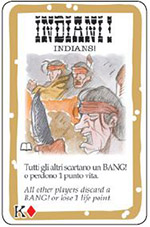
Indians!: each player, excluding the one who played this card, may discard a BANG! card, or lose one life point.
Neither Missed! nor Barrel have effect in this case.
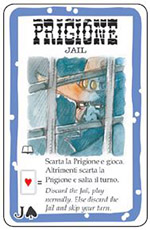
Jail: Play this card in front of any player regardless of the distance: you put him in jail! If you are in jail, you must "draw!" before the beginning of your turn:
if you draw a Heart card, you escape from jail: discard the Jail, and continue your turn as normal;
otherwise discard the Jail and skip your turn.
If you are in Jail you remain a possible target for BANG! cards and can still play response cards (e.g. Missed! and Beer) out of your turn, if necessary. Jail cannot be played on the Sheriff.
Continue Reading


